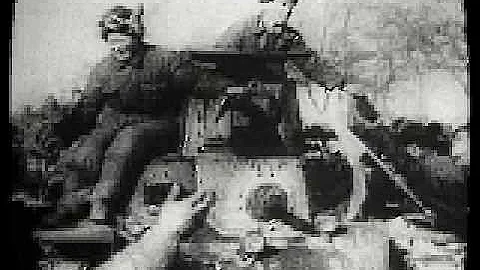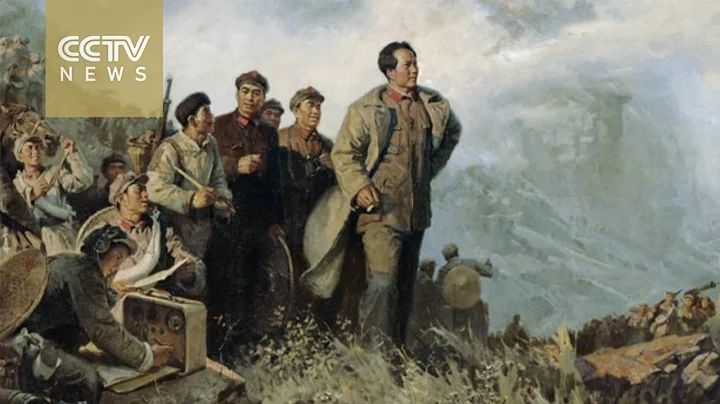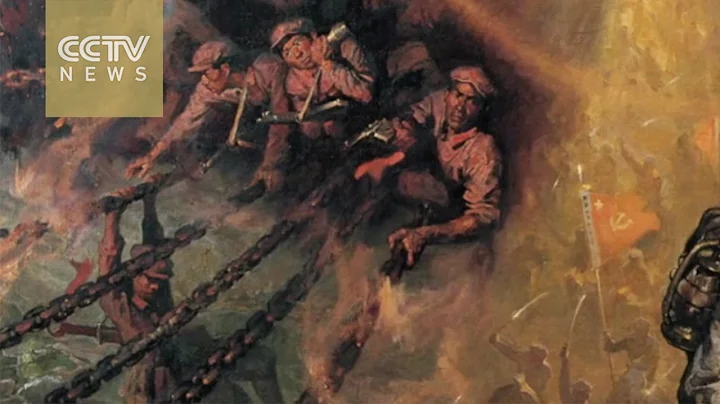In 1935, the chairman asked Xu Xiangqian for his opinion before heading north. Xu Shuai: It is not appropriate for the two armies to be separated again!

The most important sentence Xu Xiangxiang said in his life is: How can there be any reason for the Red Army to fight the Red Army!
Without Xu Xiangqian’s words, Chinese history would likely have been rewritten.
The Red Fourth Front originally headed by Xu Xiangqian, achieved a grand meeting with the Central Red Army led by Zhu Mao during the Long March . This is a great good thing. We have reached a consensus at the Lianghekou Conference to march north together. . If this is the case, the Long March is likely to end early and the Red Army will avoid many unnecessary losses.
But Zhang Guotao changed his mind and insisted on going south to Sichuan.
Zhang Guotao believed that the Fourth Front Army of the Red Army was now far stronger than the Central Red Army and that he should gain a dominant position.
In this way, Xu Xiangqian was in a very embarrassing situation, and he had wanted to leave Zhang Guotao for a long time.

Although Xu Xiangqian was the commander-in-chief of the Fourth Red Army, his cooperation with Zhang Guotao and political commissar Chen Changhao was not pleasant. From the Hubei-Henan-Anhui Soviet Area to the Sichuan-Shaanxi Soviet Area, Xu Xiangqian saw too many sacrifices of his comrades, and even his wife Cheng Xunxuan was arrested by Zhang Guotao Killed!
After the Fourth Red Front Army and the Central Red Army joined forces, Xu Xiangqian wanted to do something for the central government, and even suggested that Liu Bocheng should replace him. For this reason, he specifically talked to Chen Changhao, but in that environment Xu Xiangqian's idea could not become a reality. .
First of all, he is the highest military commander of the Fourth Red Army. The Long March is not over yet, and the enemy is still chasing and intercepting the Red Army. Naturally, the troops cannot do without his Dinghaishenpin.
Secondly, when leaving the Fourth Front Army of the Red Army, one must consider the feelings of Zhang Guotao and Chen Changhao. It would be embarrassing for Zhang and Chen to leave the Fourth Front Army of the Red Army just after the two armies joined forces.
Finally, Xu Xiangqian also had to consider whether his stay or departure would affect the unity of the two armies. Zhang Guotao had already had thoughts about the central government. Once Xu Xiangqian went to the central government, he would leave evidence and excuses for Zhang Guotao.
Therefore, although Xu Xiangqian wanted to leave the Fourth Red Army emotionally, he had to continue to cooperate with Zhang Guotao and Chen Changhao against his will.

When Zhang Guotao decided to go south, the central government placed high hopes on Xu Xiangqian, hoping that he could persuade Zhang Guotao to change his mind.
Leaders such as Mao Zedong, Zhou Enlai and Zhang Wentian carefully analyzed the relationship between Zhang Guotao, Chen Changhao and Xu Xiangqian. In the Red Fourth Front Army, Zhang Guotao had the big idea. After Zhang Guotao and Chen Changhao reached an agreement, Xu Xiangqian commanded the troops as established. Policy implementation.
But under special circumstances, if Chen Changhao and Xu Xiangqian agree, Zhang Guotao can basically follow their suggestions.
Mao Zedong admired Xu Xiangqian very much and compared him to the "hen" of the growing Fourth Red Army. He believed that only he could persuade Zhang Guotao, because Chen Changhao, the second-in-command of the Fourth Red Army, had agreed with the central government and was preparing to go north.
But he did not expect that Chen Changhao would side with Zhang Guotao at the critical moment and advocated going south.
In this way, Xu Xiangqian became the most difficult person.

On September 9, 1935, what Xu Xiangqian didn’t expect was that Mao Zedong came to him in person.
In fact, Mao Zedong made a special trip to inquire about his attitude towards the march of the troops. Since Zhang Guotao insisted on going south, Mao Zedong and the central government had no choice but to lead the First and Third Army Corps to march northward overnight. Before leaving, Mao Zedong came to Xu Xiangqian specifically, hoping that things would still turn around.
Mao Zedong stood in the yard and asked Xu Xiangqian: "Comrade Xiangqiang, what do you think?"
Xu Xiangqian replied: "Since the two armies have joined together, it is not appropriate to separate. If the Fourth Front Army is divided into two halves, I am afraid it will be difficult to command. "
Mao Zedong didn't speak after hearing this, nodded silently, turned and left.
What Xu Xiangqian didn't expect was that it would be a year before he saw Mao Zedong again after this farewell.

Xu Xiangqian always wanted to leave Zhang Guotao and Chen Changhao, but what he didn't know was that he missed an excellent opportunity to leave Zhang Guotao.
When Mao Zedong came to him, he could have said, I support going north and I am willing to act with you (Xu Xiangqian originally supported going north).
Many people hold this view. Xu Xiangqian misjudged the situation. If he went north with the Central Committee, he would not only avoid many losses of the Fourth Red Army, but also put himself on a completely different life path.
But this statement is only "if". In that case, how could it be possible to leave the troops and go north alone? Xu Xiangqian is not an ordinary soldier or a grassroots cadre. He is the commander-in-chief of the 100,000-strong Fourth Red Army. His decision to stay or leave is not his alone!
If he really did that, Xu Xiangqian would not be Xu Xiangqian but Li Kui.

So, what is the specific reason why Xu Xiangqian was unable to follow the Central Committee to go north? After analysis, we believe that there are two reasons, one is subjective and the other is objective.
The subjective reason is that, as Xu Xiangqian said to Mao Zedong, he did not want to divide the army into two halves.
As Mao Zedong said, the Fourth Red Army gradually grew into a heroic army with one hundred thousand soldiers under the care of Xu Xiangqian, a "hen".
Xu Xiangqian is different from most senior generals in the army. He has not experienced the Nanchang Uprising, the Jinggangshan Beacon Fire, or the counter-encirclement and suppression campaigns in the Central Soviet Area. His main focus in the first half of the Red Army period was on the Hubei-Henan-Anhui Soviet Area. Witnessing the development and growth of the Fourth Red Army, this experience is clearly and detailedly described in "Xu Xiangqian's Memoirs".
Xu Xiangqian is a person with strong organizational principles. On the one hand, Mao Zedong’s correct opinions and the Central Committee’s decision to go north, and on the other hand, his immediate boss Zhang Guotao’s southward strategy. Not only is it difficult for him to be caught in the middle, he also has to consider Regarding the overall fate of the army, the last thing he wanted to see was a split in the team.
Therefore, Xu Xiangqian did not go north with the Central Committee because he had his own considerations.

The objective reason is that it is impossible for Xu Xiangqian to take away the Fourth Red Army.
From another perspective, even if Xu Xiangqian wanted to go north, he would not be able to bring the Fourth Red Army with him.
Yes, he is the commander-in-chief of the Fourth Red Army, but in fact he is only the fourth in command.
In addition to Zhang Guotao and Chen Changhao, there is also Zhou Chunquan in front of him! Zhou Chunquan's reputation is definitely slightly inferior to that of Xu Xiangqian, but he is not an ordinary person. He was the founding general in 1955. More importantly, he was the leader of the security work of the Fourth Front Army of the Red Army. As early as May 1935, he was the leader of the sand nest. At the meeting , he became a member of the Political Bureau and the leader of the party. However, Xu Xiangqian entered the Politburo for the first time at the Eleventh Plenary Session of the Eighth Central Committee of the Communist Party of China in 1966, a full 31 years later than Zhou Chunquan!
By the way, Xu Xiangqian’s wife Cheng Xunxuan was captured and killed by Zhou Chunquan.
Therefore, with the consensus of the leadership, Xu Xiangqian had no problem commanding the Fourth Front Army of the Red Army to fight, but it was absolutely impossible for him to take away the troops by himself. Not to mention anything else, the prestige and influence of Zhang Guotao and Chen Changhao His strength is by no means inferior to that of Xu Xiangqian.
Therefore, going north became impossible for Xu Xiangqian, unless he left the army behind and walked alone.

After experiencing suffering and glory, Xu Xiangqian finally became the Marshal of the Republic!
After Xu Xiangqian's Long March, he experienced the failure of the West Route Army , but after he returned to Yan'an , unlike Zhang Wentian, Mao Zedong warmly received him at the first time, comforting him and saying that it would be good if you came back, and if you have chickens, There are eggs - again comparing him to a hen.
During the Anti-Japanese War, Xu Xiangqian once again cooperated with his old partner Liu Bocheng and served as the deputy commander of the 129th Division of the Eighth Route Army. However, he has been absent from front-line combat command for many years due to health reasons.
During the Liberation War, Xu Xiangqian, who had been idle for a long time, returned to the battlefield. He first served as deputy commander of the Shanxi-Hebei-Luyu Military Region, and later as deputy commander of the North China Military Region. He led tens of thousands of militia-based troops to conquer Shanxi without any opponents, and finally liberated all of Shanxi. , what he actually performed was the responsibility of the military chief of a strategic region.
After liberation, Xu Xiangqian served as the first Chief of General Staff of New China. Although he was in poor health and could not take charge of the work, the daily work was handled by Deputy Chief of General Staff Nie Rongzhen. However, the Central Committee always insisted that he take the lead in the work, and Nie Shuai never Become a regular employee.
In the 1955 grand conferment, Xu Xiangqian became the Marshal of the Republic, ranking eighth after Luo Ronghuan and before his old boss Nie Rongzhen.
Among all the senior generals of the People's Liberation Army, Xu Xiangqian is one of the most capable war gods. Together with Peng Dehuai, Lin Biao, Liu Bocheng and Su Yu, he is known as the "Five Tiger Generals" of the People's Liberation Army.





















